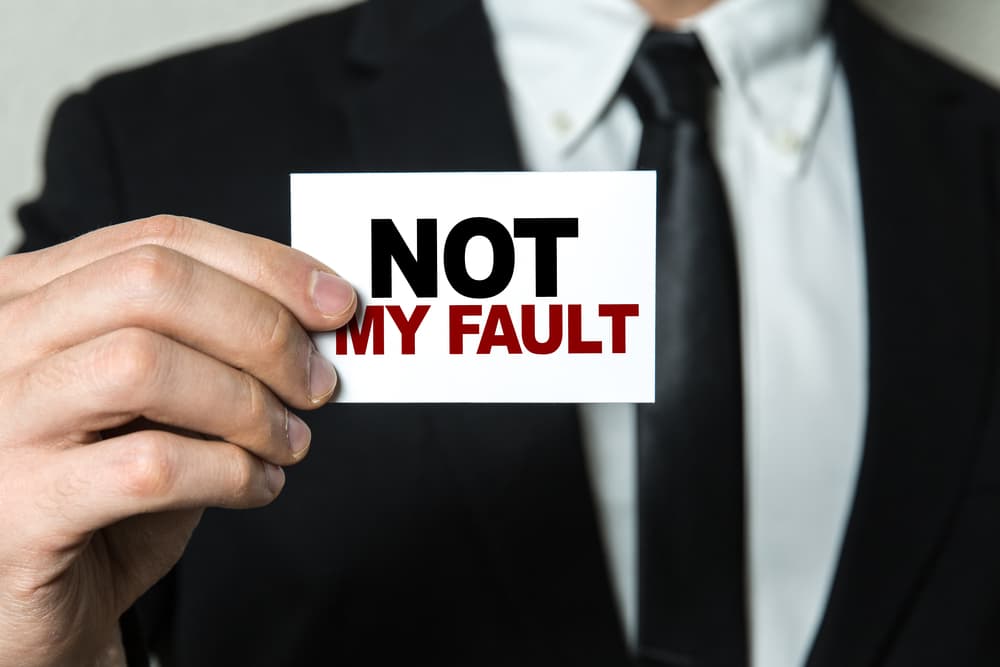
Everything that you do after an accident is important. The words that you speak can have a ripple effect that impacts the success of your claim. Insurance companies do not want to pay injured people, so they seek any reason to avoid it. Do not let an insurance adjuster reduce or deny your payment based on what you say. Consult with a personal injury lawyer immediately to ensure that your statements are aligned with protecting your rights.
Certain statements can hurt your claim. In this article, we will discuss what you should say and what you should avoid saying to protect your right to recover financial compensation after an accident. Keep in mind that insurance companies can twist or misuse anything you say, so approach every conversation with caution.
If you suffered an injury after an car accident, contact a St. Louis car accident attorney to discuss your legal rights and the availability of compensation. Do not hesitate to start building your legal team today! A personal injury lawyer can guide you through every step, ensuring your rights are protected from the outset.
Continue reading to learn more about handling conversations with the insurance company after an accident. Knowing how to communicate effectively with them can be the key to securing a fair settlement.
Do Not Speculate About Your Injuries
 Do not over-explain or speculate about your injuries with an insurance company. You need to not divulge too much. Giving the insurance company too much information will hurt your claim. Insurance companies will use any information you give against you after an accident.
Do not over-explain or speculate about your injuries with an insurance company. You need to not divulge too much. Giving the insurance company too much information will hurt your claim. Insurance companies will use any information you give against you after an accident.
Additionally, do not speculate about how the accident happened. Stick only to the facts when speaking to an insurance company after an accident. It might be tempting to fill in the details of the accident with assumptions; it is not wise to guess when dealing with insurance companies.
Do Not Downplay Your Injuries
Never downplay your injuries after an accident. It might be tempting to respond with “I’m fine” when asked about your condition, but insurance companies take those statements literally.
Additionally, some injuries take time to appear. For example, the accident might have caused you to suffer a concussion, whiplash, and soft tissue injuries may show symptoms days or weeks after the accident.
If you tell the insurance adjuster you are not hurt, they can use that to deny medical claims later. Instead of saying, “I’m fine,” try letting the insurance company know that you are seeking medical attention.
Do Not Provide a Written or Recorded State Without Legal Advice
Insurance companies often ask accident victims to give them a statement about the accident immediately after it happened. The insurance company can edit, misinterpret, or take any statement you offer out of context, weakening your claim. If the insurance company asks you to provide a statement, direct the adjuster to your attorney’s office.
Do Not Accept an Early Settlement Offer
One tactic that insurance companies use to avoid making payments to accident victims is to settle quickly. Typically, the first settlement offer from an insurance company is inadequate to cover the full extent of your damages. Once you accept an offer, you cannot ask for more money later, even if medical bills increase. You should always have an attorney review the offer before accepting it.
Do Not Post About the Accident on Social Media
 Using social media apps is a regular part of most people's lives, but after an accident, insurance companies may look at your posts to challenge your claim. Insurance companies investigate claims using the tools that they have at their disposal, including social media. Insurers will monitor your social media accounts, looking for inconsistencies in your story. Even innocent posts or pictures can harm your case. The best practice is to avoid discussing the accident or injuries online.
Using social media apps is a regular part of most people's lives, but after an accident, insurance companies may look at your posts to challenge your claim. Insurance companies investigate claims using the tools that they have at their disposal, including social media. Insurers will monitor your social media accounts, looking for inconsistencies in your story. Even innocent posts or pictures can harm your case. The best practice is to avoid discussing the accident or injuries online.
Do Not Agree To an Independent Medical Exam Without Legal Advice
Some insurance companies will want you to submit an independent medical exam during their investigation. The doctors for the insurance company complete these physical examinations. The doctors work for the insurance company, not you. Having an exam done without legal guidance can be devastating to your claim. A biased independent medical practitioner can claim that your injuries are not severe, giving the insurer an excuse to deny medical coverage.
Do Not Say, “I Was Distracted”
Distracted drivers cause serious accidents across the country. Even if you think it is possible that you were distracted after an accident, do not admit it to the insurance company. Insurance companies seek any excuse to claim you contributed to or caused the accident. Never mention being rushed, distracted, or tired during the accident. Stick to the basic facts of the accident without unnecessary personal details.
Do Not Say, “I Don’t Remember What Happened”
Just like you should not overshare about the accident, you should not admit to the insurance company that you do not remember what happened. Avoid saying so outright if you do not remember certain details about the crash. If you admit that you do not remember what happened, the insurance company might argue that your account of the crash is unreliable and untrustworthy. Instead, express that you are still recalling the events and may need more time to provide a complete account.
Do Not Admit That You Are In a Rush to Complete the Investigation
If an insurance adjuster senses that you are in a hurry, they might pressure you to accept a lowball settlement offer. Rushing into a settlement may leave money on the table, especially if future medical bills arise. Instead of suggesting you are in a rush to resolve the accident claim, tell the insurance company you need time to carefully review everything before making a final decision.
Do Not Say, “I Only Had a Drink or Two Before Driving”
 If the accident involves alcohol, do not admit anything to the insurance company. Even if you were not intoxicated, admitting to drinking before the accident can hurt your claim. The insurance company may use this admission as evidence of impaired judgment to reduce or deny your settlement. Never volunteer unnecessary information; only provide what is relevant to the accident.
If the accident involves alcohol, do not admit anything to the insurance company. Even if you were not intoxicated, admitting to drinking before the accident can hurt your claim. The insurance company may use this admission as evidence of impaired judgment to reduce or deny your settlement. Never volunteer unnecessary information; only provide what is relevant to the accident.
Do Not Say, “I Wasn’t Wearing a Seatbelt”
Admitting to not wearing a seatbelt can give the insurance company grounds to deny your claim. If you admit to not wearing a seatbelt, the insurance company may reduce your compensation under certain negligence laws. Some states reduce settlement if the injured person contributed to their injuries. Instead, avoid volunteering unnecessary details unless legally required to. Work with a lawyer to understand what information you must divulge and what you can avoid saying.
Do Not Say, ‘I Don’t Need Any More Medical Treatment”
Even if you believe your injuries are minor, you do not know how they will develop. Telling the insurance company that you have finished medical treatment can limit your options if your injuries worsen or new injuries develop over time. Instead, consider letting the insurance company know you follow your doctor’s recommended treatment plan and will continue to monitor your recovery as advised.
Do Not Authorize The Insurance Company To Receive Your Medical Records
Insurance companies want to find any information they can use against you to avoid making payments. Giving the insurance company unlimited access to your medical records will give them the necessary information to build a case against you. Only release your medical records of the accident to your attorney after a consultation.
Do Not Assume That The Insurance Company is on Your Side
Some accident victims make a fatal mistake by assuming the insurance company is on their side. Insurance companies, even your own, want to protect their profits at the expense of real injury victims. When interacting with insurance companies, be polite, but remember that their goal is to reduce payouts.
Do Not Say That You Were “Just Driving Normally”
Even a seemingly innocent statement like, “I was just driving normally,” can be twisted by the insurance company. Statements like these can imply that you were not fully alert or driving on “auto-pilot” when the accident happened. Instead of making this kind of statement, which can work against you, focus on describing the events as they happened. You can mention traffic signals, speed, and weather or road conditions.
Do Not Discuss Pre-existing Medical Conditions Without an Attorney Present
Never mention pre-existing medical conditions to an insurance company without talking to an attorney first. If you mention a previous injury, the insurer may argue your new injuries were pre-existing and not caused by the accident. Instead of saying, “I’ve had neck pain before the accident,” let a medical professional explain the cause of your injury. An attorney can help connect you with a medical expert witness.
Never Say You’re Sorry or Admit Fault for the Accident
 Apologizing after an accident is probably a knee-jerk reaction. It seems polite to start a conversation with another driver before collecting their contact and insurance information. While saying “I’m sorry” is a nicety, apologizing for the accident can be the death of your claim. Insurance companies will use your apology against you.
Apologizing after an accident is probably a knee-jerk reaction. It seems polite to start a conversation with another driver before collecting their contact and insurance information. While saying “I’m sorry” is a nicety, apologizing for the accident can be the death of your claim. Insurance companies will use your apology against you.
Everything you say to an insurance company is helping them build a case against you. Insurance companies use apologies as an admission of guilt. When you speak to an insurance company, avoid expressing apologetic sentiments. Stick to the facts when speaking with these companies. Consider that apologizing may imply accepting responsibility for the incident. An insurance company might argue, "Why apologize for something you did not cause?" To avoid exploitation by an insurance company, remain factual and resist being overly polite when communicating with them.
Instead of apologizing, let the investigation play out. Remaining neutral is important to avoid swaying the investigation results. Speaking to an experienced personal injury lawyer before you talk to an insurance company is best. Attorneys know the games that insurance companies play and can navigate the process to secure the compensation you deserve. That is why it is always best to speak to a lawyer before providing the insurance company with written or recorded statements.
Do Not Speak To An Insurance Company Without an Attorney
For the best results after an accident, always speak to an attorney before you talk to an insurance adjuster. Hiring an attorney means that you will have someone to communicate with the insurance company on your behalf. An attorney will use their knowledge and experience to get you the best possible results from the insurance company after an accident.
How Can an Attorney Help Me After an Accident?
Creating a legal team after an accident is the best way to protect yourself after being injured in an accident. Here are some of the most important ways your lawyer can support you:
Negotiate On Your Behalf
An accident attorney can represent you during settlement negotiations with the insurance company. Some insurance adjusters use underhanded tactics to avoid making legitimate payments to accident victims. An attorney will know how to navigate these tactics to ensure you get the full and fair compensation you deserve after an accident.
Investigate On Your Behalf
An insurance company will investigate the accident. They have a bias against you and for their insured. The goal is to ensure they pay as little as possible after an accident, preferably without money.
An attorney will investigate for you. Your lawyer will investigate the facts of the case and uncover the cause of the accident to ensure protection from insurance company bias.
Having a lawyer means that there is one less burden on you as you try to heal from your injuries. While you are healing, your attorney will handle the legal side of recovery.
Contact an Accident Attorney Today!
If you are unsure what to say to the insurance company, the safest approach is to consult an accident attorney before talking to an insurance adjuster. A lawyer will handle your claim properly and ensure you receive the full compensation you deserve.
Contact a personal injury lawyer today to protect your legal rights after an accident!





 RSS Feed
RSS Feed